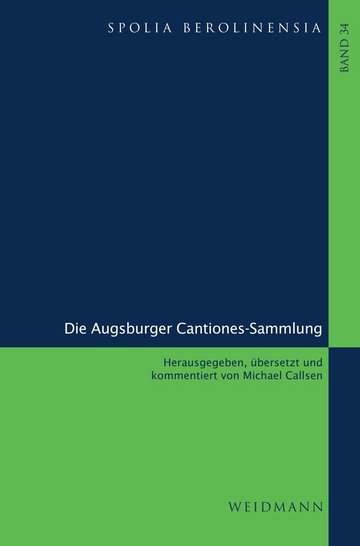Die Augsburger Cantiones-Sammlung
Berliner Beiträge zur Mediävistik

| Verlag | WEIDMANN |
|---|---|
| Erscheinungsjahr | 2015 |
| Seitenanzahl | 385 Seiten |
| ISBN | 9783615401035 |
| Format | |
| Kopierschutz | Wasserzeichen/DRM |
| Geräte | PC/MAC/eReader/Tablet |
| Preis | 39,99 EUR |
Mit ihren etwa 70 lateinischen Liedern aus dem 13. und 14. Jahrhundert bietet die Augsburger Cantiones-Sammlung eine einzigartige Quelle für die lateinische und die germanistische Forschung. Den Kern der Sammlung bilden Lieder in den Tönen deutscher Spruchdichter, die den heutigen Leser durch die Augen mittelalterlicher Dichter und Zeitgenossen der großen Spruchdichter auf dieses vielseitige Genre der deutschen Literaturgeschichte blicken lassen. Zugleich findet diese aktive Rezeption in einem Kontext genuin lateinischer Dichtungstradition statt, der keinen Zweifel daran lässt, dass sich die Dichter der Lieder und die Redakteure der Sammlung des hohen Anspruchs ihres Projekts bewusst waren: Sie schufen nicht bloße Imitationen, sondern bereicherten die deutsche und die lateinische Literatur gleichermaßen. Diese wichtige literatur- und kulturgeschichtliche Quelle wird durch die vorliegende Edition erstmals in Gänze erschlossen und durch eine deutsche Übersetzung und einen Stellenkommentar der interessierten Öffentlichkeit zugänglich gemacht. ************************************* With some 70 Latin songs from the 13th and 14th centuries, the Augsburg Cantiones Collection represents a unique source for researchers in the fields of Latin and German studies. Songs in the tones of German 'Spruchdichter' form the core of the collection and allow the modern reader to look at this multi-faceted historical genre of German literature through the eyes of mediaeval poets and contemporaries of the great 'Spruchdichter'. At the same time this active reception took place in the context of a genuine Latin poetic tradition, which leaves no doubt that the writers of the songs and the editors of the collection were aware of the high standards required for their project. They were not creating mere imitations but were enriching both German and Latin literature in equal measure. This is the first edition to offer a complete insight into this important literary and cultural source, with a German translation and a commentary as well as a full edition of the text.
















